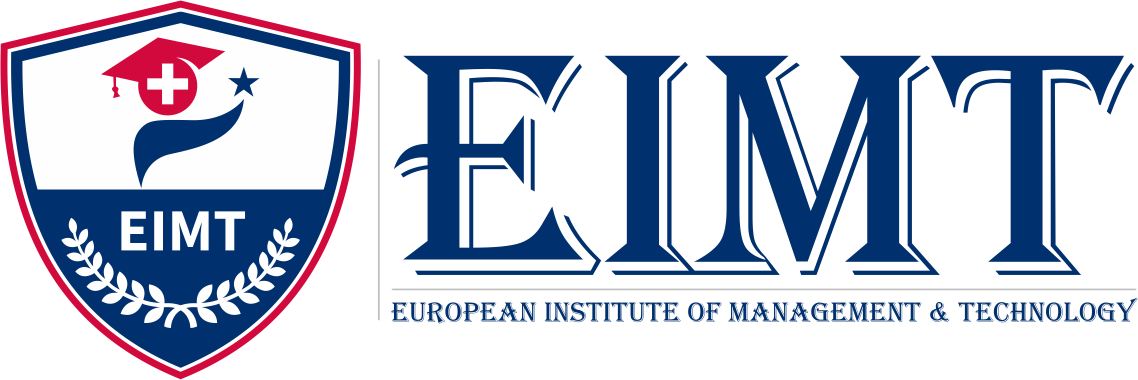
Master of Business Administration
- Home
- Master of Business Administration
Program Overview
The European Institute of Management and Technology offers a two-year MBA program designed to equip students with the tools and analytical skills necessary for a successful career. The international community of faculties and alumni provides students with a global perspective in today's ever-changing economic world.
Salient Features
-
18 Months online Program.
-
Specially Designed for Working Professionals
-
Ample no. of specializations to choose from.
-
International Networking Opportunities.
-
Highly Qualified Industry Experienced Faculties.
-
Focused & Unique Curriculum.
-
Get a holistic and strategic understanding of business.
-
Discover the latest business and industry trends.
Achieve Your Dream
Master of Business Administration(MBA)
Our Online MBA program is tailored to you based on your history, the number of ECTS (European Credit Transfer and Accumulation System) points you’ve already earned, and/or the qualifications you’ve already earned. The Online MBA courses are taught by PhD-educated teachers with extensive experience working in a variety of industries. Professionals who already have an internationally recognized and approved degree or certification in Business & Management or related fields can enroll in the online MBA program.
The online MBA program is organized into core and specialized courses and is provided in English. The online program takes 18 months to complete. The focus of this postgraduate program is on the curriculum’s practical relevance and applicability. Financial management, the global business environment, leadership, marketing and communications, supply chain management, and strategy are among the primary subjects covered in the Online MBA course curriculum.
Throughout your studies, you will have access to useful practice-based projects and will learn to apply the curriculum to real-life situations. The future of business is now at your fingertips with EIMT’s online MBA programs. These qualifications will give you all the tools necessary for success, whether it be in management or marketing positions!
MBA Key Learning Majorly Focuses on
- General Management & Accounting
- Banking and Finance & Corporate Strategy
- Cyber-security, Information Security Analysis
- Digital Marketing, Finance management
- Human Resource Management & Entrepreneurship
- Information Systems/It/Technology Management
-
MASTER OF BUSINESS ADMINISTRATION
Our MBA program is specially designed to provide you with quality education. You will benefit from advanced training in business management. Our MBA program is developed in collaboration with many corporates across the globe. Our MBA program fits easily into your professional life. Our MBA programs are designed to train and prepare you to become leaders, managers, entrepreneurs, or business leaders.
Master of Business Administration
- Eligibility: Bachelor's Degree
- Duration: 18 Months
- Enrollment: Being online - Throughout the Year
Why Earn your MBA with EIMT
Outcomes of the Program:
-
Respond to company issues and opportunities strategically.
-
Examine the ethical consequences of corporate operations.
-
Create, execute, and evaluate corporate problem-solving solutions
-
Formalize business choices and conduct a systematic examination that demonstrates critical thinking. display good collaboration abilities with a variety of people.
-
Lead teams to problem-solving solutions and effective project and task completion.
-
Take responsibility for decisions and include personal beliefs and opinions in issue solutions.
-
As a consequence of rigorous information analysis, communicate ideas convincingly (both written and spoken).

Important Information Regarding MBA Program
Program Delivery



Professional Professors
Academic Qualifications:
Language Competence:
Learners must have a thorough command of written and spoken English. One of the following pieces of evidence is compulsory.
Application Go Through:
Applications are only accepted online. Once the application form is received, our team looks after the past performance and future potential and will contact you accordingly.
What is Next?
The Curriculum
Modules Covered
-
Strategic Management
The Strategic Management provides students with a deep grounding in the basic logic of competitive advantage, premised on a careful analytical treatment of the distinct qualities and positions of individual firms and an understanding of broader competitive dynamics. This background positions students well for guiding strategy at both established and emerging enterprises, as well as preparing them for positions with consulting firms that work with firms in setting their strategies.
-
Strategic Leadership
This unit provides an in-depth understanding of the key principles and practices of leadership. It will enhance the knowledge, skills and abilities of the individual. The qualities needed to participate effectively in the roles and responsibilities required of a team member and effective team leader; proactively innovate and innovation to inform strategy and business planning within the organization.
-
Strategic Human Resource Management
The aim of this unit is to develop learners’ understanding of the concepts of competition and contrast. Strategic perspective of human resource management. This unit develops learners’ understanding of how people are managed strategies and practices that contribute to organizational and employee performance, and issues and complexities involved in implementing HRM strategies of different types organization
-
Advanced Business Research Methods
The objective of this subject is to develop the learner’s ability to prepare for different types of academic study in management through the development and Design a research proposal. Learners will develop a deep understanding of the philosophical, practical and ethical concepts of research business environment context.
-
Strategic Financial Management
The purpose of this unit is to help learners apply financial principles relevant to management in an organizational context, including analytical techniques and management accounting theories/models, evaluate budget processes, recommend sources of financing, and evaluate investment options.
-
Supply Chain and Operations Management
The objective of this unit is to develop learners’ understanding of the concepts and models of effective operations and supply chain management in a competitive context. Market using case studies and real industry scenarios. Learners will develop an understanding of business processes, engineering and planning and control system.
-
Entrepreneurship and Innovation
The objective of this subject is to introduce learners to basic knowledge of business processes and strategies related to entrepreneurship and entrepreneurship, develop knowledge of business and entrepreneurship in a global context.
-
Globalisation and Corporate Governance
The aim of this unit is to develop learners’ understanding of the impact of law, ethics and global integration on decisions, corporate governance, Policies, procedures and activities carried out by organizations. -
Strategic Change Management
The aim of this unit is to develop learners’ understanding of classical and contemporary theories of change management and how to apply them to Contemporary organizations in a globalized world, with the identification and use of changing models. Learners will understand employees characteristics of change agents as well as assessing and developing leadership skills to fulfil current and future change management roles
-
Strategic Marketing
Throughout the duration of this module, learners delve into various marketing strategies and consumer behaviours. Moreover, learners shall explore market segmentation, promotional techniques, and the role of marketing in creating customer value, amongst other principles of marketing.
-
Business Research Project
This module serves as a capstone experience for students, providing an opportunity to apply their acquired knowledge and skills in a real-world context. This module focuses on conducting independent research within the field of business administration, allowing learners to explore a specific topic of their choice in depth.
Frequently Asked Questions
-
How much time should I spend on coursework each week?
Expect approximately 6 hours of work per week. This may include lecture videos, readings, discussions and assessments.
-
What is the GPA requirement?
There is no minimum GPA requirement, but a 3.5 or higher is preferred. The average undergraduate GPA for our online MBA students is 4.0.
-
What type of work experience are you looking for in the admissions process?
We seek diversity in the professional backgrounds of our admitted students, just as we do in other parts of our applicants' profiles. No one industry or field is favored over another. We are more interested in your contribution to the group or organization.
-
I’m worried about the time zone difference; how will this work for live lectures?
Live sessions will take place according on different time zones.
-
How many live lectures will there be?
The number of live classes will vary depending on the module – at least one session per week can be expected, but there will likely be more. Ad-hoc classes may also be scheduled, depending on the module.
-
How exactly shall I organise my week?
This will vary for each student, but the time commitment per module is usually 180 hours (for the total module) taking into account the lessons taught and individual studies in the field of study, which means about 9-15 hours per week. This will also be different in the second year, depending on the chosen module.
-
How much time would I need to devote to study?
The Global Online MBA is a 24-month program taught online through our innovative learning platform. We recommend a minimum of 10-15 hours of study per week, depending on your course and academic goals. This will include written and live lessons, readings, assignments, discussions and group activities, seminars, assignments and career support.
-
What kind of support is available?
As an online student, you will have access to several types of support resources when you need help or guidance, beginning with new student orientation. Other services include a help desk for technical issues, a student services coordinator, financial aid advisers and more.
-
How long does it take to complete the Online MBA Program?
The Online format is self paced, but was designed to be completed in two years. It is possible to accelerate or slow down the pace to fit your schedule and timeline.
-
What are the career options after MBA ?
CEO | Entrepreneur | Managing Director | Project Manager | Account Executive | Business Consultant | General Manager | Finance Manager | Marketing Manager | Operations Manager | Product Manager | Sales Director | Business Development Manager | Strategic Advisor | Human Resources Manager
-
Do I need an undergraduate business degree or business classes to be admitted?
We welcome applications from a wide variety of backgrounds and do not look for or favour specific undergraduate majors. Business classes are not required before entering the MBA Program.
